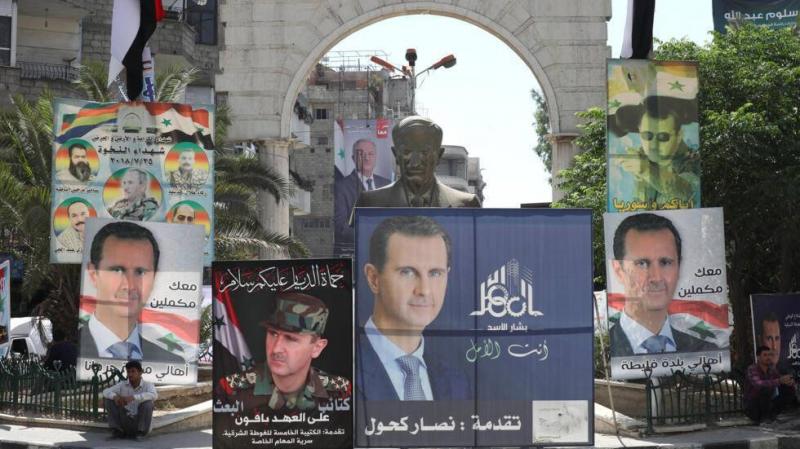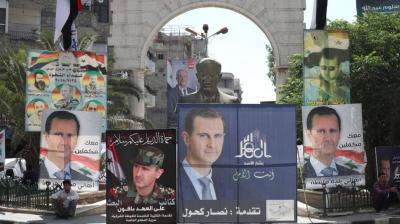The recent positions expressed by Hezbollah's Secretary-General Hassan Nasrallah during the funeral of military commander Fouad Shokr, who was assassinated by Israel in southern Beirut, suggest that he has exempted the Syrian regime from joining the "Unity of Fronts" comprised of forces aligned with the axis of resistance since the party decided on October 8 to support Hamas in Gaza, as reported by Asharq Al-Awsat. The absence of the Syrian regime in the ongoing confrontation in the region raises several questions: Will it continue to remain neutral if the conflict escalates into a wider war, or will it become involved? What will it say to its allies in the axis of resistance, specifically Iran and Hezbollah, who did not hesitate to support it during its war against Syrian opposition forces at its request, playing a role in its protection and preventing its collapse?
### Syrian Silence
While Hezbollah has activated the support front in southern Lebanon, the Syrian regime remains silent and has not engaged in the confrontation, even in terms of political or media solidarity with its ally. It only responded to the missile that targeted the town of Majdal Shams in the Syrian-occupied Golan Heights over 24 hours after it landed in a soccer field, despite the fact that Syria frequently faces airstrikes from Israeli warplanes targeting Syrian military sites and others belonging to the Iranian Revolutionary Guard and Hezbollah.
It appears that both the party and Iran are simultaneously avoiding, at least publicly, entering into a dispute with the Syrian regime regarding its refusal to join the support front for Gaza. They prefer to keep the discussions limited to private meetings away from the spotlight to understand the regime’s rationale for its position, which contradicts the forces that make up the axis of resistance.
Sources close to this axis indicate that it understands the Syrian regime's reluctance to join the Gaza support fronts but expects that it will participate in the confrontation if Hezbollah faces a widespread Israeli attack. The sources confirm that the possibility of the regime entering the support battle was discussed between Syrian President Bashar al-Assad and Russian President Vladimir Putin during Putin's recent visit to Moscow.
### Damascus' Intentions to Realign International Relations
Until there is a change in the official Syrian position decided by President Assad, as expected by sources closely linked to the axis of resistance, the regime's opponents view Syrian neutrality from the perspective that what matters to Damascus in the foreseeable future is to realign its relations with the international community, leading to the submission of its credentials in a political sense, in preparation for rejoining the global order under Western-American supervision. Otherwise, what prevents the Syrian regime from standing in solidarity with its allies in the axis, especially after the assassination of Shokr and the head of Hamas' political bureau, Ismail Haniyeh? Unless it has forfeited its right to politically "claim" involvement with Hamas due to its participation with the Syrian opposition in its uprising to change the regime, limiting itself to providing logistical support to Hezbollah while remaining in a state of military standoff with Israel.
Questions remain regarding the political implications of Nasrallah's speech, which aimed to boost the morale of the party's supporters, countering attempts to undermine it on the grounds of lacking an alternative military leader to Shokr, and affirming that there is no option but to respond to his assassination, emphasizing that the party is capable of filling the void he left.
### The Party's Response "Is Inevitable"
From the party's perspective, sources indicate that it will not succumb to pressure to deter it from retaliating against Shokr's assassination. It has prepared a plan to launch a strike against Israel, reserving the choice of timing and place for the operation, which will be as severe as possible. It has not clarified whether its response will coincide with actions planned by Iran and the resistance axis's arms in Iraq and Yemen, merely stating that a response is indeed forthcoming after Israel has crossed all red lines and violated the rules of engagement.
Sources assert that Iran will not politically tolerate the assassination of Haniyeh on its territory and view the raising of red flags during his funeral in Tehran as confirmation of plans for revenge against Israel for a crime that has shaken its global standing.
Additionally, sources from multiple diplomatic channels informed Asharq Al-Awsat that foreign ambassadors in Beirut have attempted to send messages through existing communication channels with party officials, advising the possibility of separating the responses to Israel rather than launching them simultaneously.
These ambassadors argue that implementing a "staggered" approach to responses over a period of two or three days between each retaliation would allow for international mediations to prevent the escalation of the confrontation into a wider regional war.
According to the information, the party has taken note of the advice received from several Western entities but has not expressed any comments or responses, stating directly to intermediaries or ambassadors that a response is forthcoming and that the battlefield will dictate the timeline.




